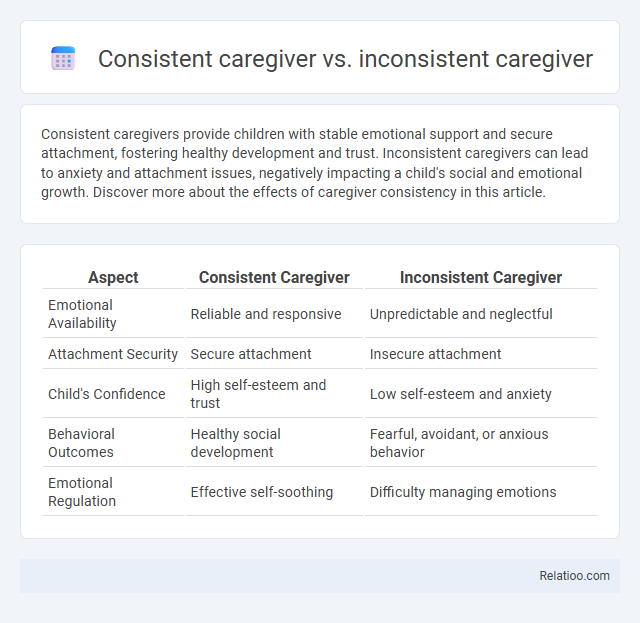Consistent caregivers provide children with stable emotional support and secure attachment, fostering healthy development and trust. Inconsistent caregivers can lead to anxiety and attachment issues, negatively impacting a child's social and emotional growth. Discover more about the effects of caregiver consistency in this article.
Table of Comparison
| Aspect | Consistent Caregiver | Inconsistent Caregiver |
|---|---|---|
| Emotional Availability | Reliable and responsive | Unpredictable and neglectful |
| Attachment Security | Secure attachment | Insecure attachment |
| Child's Confidence | High self-esteem and trust | Low self-esteem and anxiety |
| Behavioral Outcomes | Healthy social development | Fearful, avoidant, or anxious behavior |
| Emotional Regulation | Effective self-soothing | Difficulty managing emotions |
Introduction to Caregiver Consistency
Caregiver consistency refers to the stability and predictability of having the same individual provide care over time, which is crucial for a child's emotional and cognitive development. Consistent caregivers foster secure attachments, enhanced trust, and better behavioral outcomes compared to inconsistent caregivers, who may cause confusion, anxiety, and attachment difficulties in children. Studies show that maintaining caregiver consistency in early childhood settings improves social skills, resilience, and long-term mental health.
Defining Consistent vs Inconsistent Caregivers
Consistent caregivers provide stable, predictable care that fosters secure attachment and emotional development in children, while inconsistent caregivers offer unpredictable or varying levels of care, leading to potential attachment issues and behavioral challenges. Caregiver consistency refers to the degree to which a child receives reliable, continuous support from the same caregivers, which is critical for healthy psychological and social growth. Studies show that higher caregiver consistency is linked to improved cognitive outcomes and emotional regulation in early childhood.
Impact of Caregiver Stability on Child Development
Caregiver consistency is crucial for your child's emotional security, cognitive growth, and social development, as stable relationships foster trust and healthy attachment. In contrast, inconsistent caregivers may lead to increased anxiety, behavioral issues, and difficulties in forming secure bonds. Research shows that children with a consistent caregiver exhibit better language skills, emotional regulation, and resilience compared to those experiencing frequent caregiver changes.
Emotional Security and Attachment Formation
Consistent caregiver presence fosters secure attachment and emotional security in children by providing reliable responses to their needs, which strengthens trust and emotional regulation. Inconsistent caregivers often lead to insecure attachment patterns, causing anxiety and difficulties in emotional development due to unpredictability in care and responsiveness. Your child's emotional well-being and attachment formation are significantly influenced by caregiver consistency, highlighting the critical role stable, nurturing relationships play in healthy psychological growth.
Behavioral Outcomes in Children
Consistent caregivers provide a stable attachment base, promoting secure emotional regulation and positive behavioral outcomes in children, such as reduced anxiety and improved social skills. Inconsistent caregivers often lead to unpredictable environments, resulting in increased behavioral issues like aggression, withdrawal, and difficulty forming healthy relationships. Studies on caregiver consistency emphasize its critical role in fostering resilience and adaptive behavior, highlighting that stable caregiving environments mitigate risks for long-term psychological disorders.
Cognitive and Social Development Effects
Consistent caregivers provide stable emotional support that fosters secure attachment, enhancing cognitive functions like memory and problem-solving in children. In contrast, inconsistent caregivers contribute to increased stress and anxiety, which can impair brain development and social skills such as empathy and cooperation. Caregiver consistency plays a crucial role in promoting healthy neurodevelopment and positive social interactions essential for long-term well-being.
Long-term Psychological Consequences
Long-term psychological consequences differ significantly between consistent and inconsistent caregivers, impacting your emotional development and mental health. Consistent caregivers provide stability and trust, fostering secure attachments and healthy emotional regulation, while inconsistent caregivers often lead to attachment disorders, anxiety, and difficulties in forming relationships. Caregiver consistency is crucial for preventing long-term issues such as depression, low self-esteem, and impaired social functioning.
Signs of Consistent vs Inconsistent Caregiving
Signs of consistent caregiving include predictable routines, emotional availability, and responsive communication that foster secure attachment and trust in children. In contrast, inconsistent caregiving manifests through erratic schedules, emotional unavailability, and unpredictable reactions, often leading to anxiety and behavioral issues in children. Caregiver consistency is critical for healthy child development, promoting emotional stability and social competence.
Strategies to Foster Caregiver Consistency
Implementing clear routines and providing caregiver training are key strategies to foster caregiver consistency, enhancing child security and emotional development. Assigning a primary caregiver to each child supports stable attachment, reducing anxiety caused by frequent caregiver changes. Regular communication between caregivers and families ensures alignment in care practices, promoting a consistent and nurturing environment.
Conclusion: Importance of Reliable Caregiving
Reliable caregiving plays a critical role in fostering emotional security and healthy development in children, making consistent caregivers essential for long-term well-being. Inconsistent caregiving can lead to attachment issues, increased anxiety, and behavioral challenges due to unpredictable emotional support. Caregiver consistency ensures stable routines and trust, which promotes resilience and positive social outcomes in child development.

Infographic: Consistent caregiver vs Inconsistent caregiver
 relatioo.com
relatioo.com